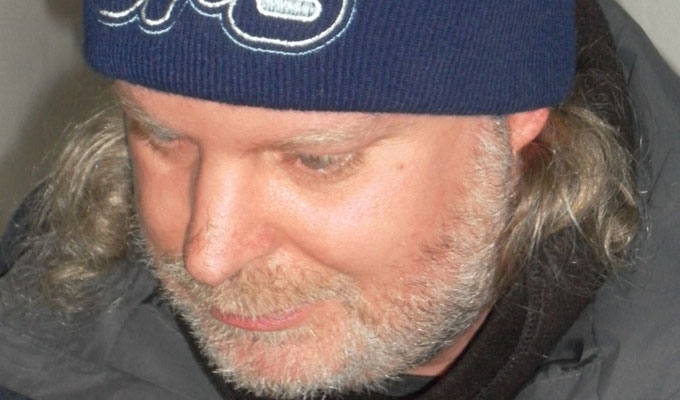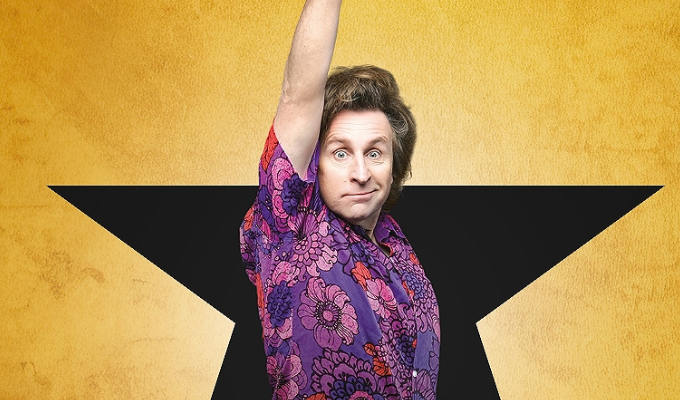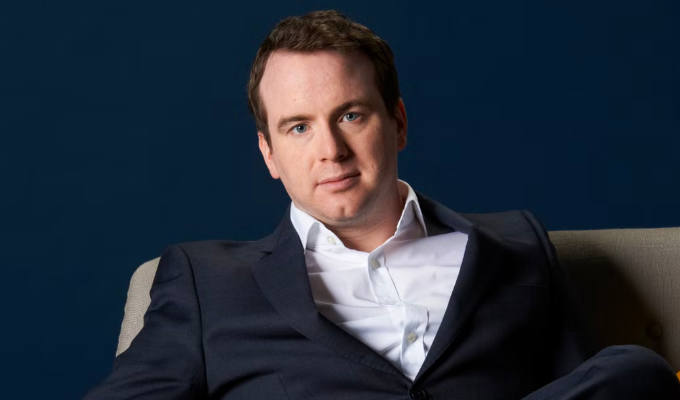
What comedy needs is partition
Alan Varley suggests a way to end the culture war
Yesterday I wrote about the culture of offence surrounding comedy, including 'safe space' policy Cardiff University used to prevent a gig by Dapper Laughs.
In February, feminist comedian Kate Smurthwaite's gig at a different university, Goldsmiths in London, was cancelled because some students who disagreed with her views on decriminalising prostitution threatened to picket the gig and security 'could not guarantee the safety of students'.
So much for Goldsmiths Students' Union's 'safe space' policy which aims to create 'an open and welcoming environment' and states that 'harassment, hostility and aggression will not be tolerated in any form'. Smurthwaite and Dapper Laughs suffered the same fate: their shows were both cancelled due to campaigning by a small minority of students who believe that they have the right to ban people of whom they disapprove.
I don't agree with 'no platform' and 'safe space' policies. However, if students' unions have them it is because those policies have been proposed, debated and endorsed in an open, democratic process. Those policies are made available for people to read and if prospective students don't want to go to a university where the students' union has 'no platform' or 'safe space' policies they can boycott them and if enough students at a university want to repeal those policies they can do so.
What seems to have happened in comedy in the last three decades is that some broadcasters, venues, promoters, comedians and audience members have introduced or tried to introduce 'no platform' and 'safe space' policies without demand, without debate and without declaring it. Comedians who were primetime TV stars in the bad old days were declared persona non grata, their spiritual heirs have been airbrushed out of post-revolution comedy history and anyone who breaks the new rules of comedy is attacked by Twitter's equivalent of the Taliban. When the rules are made in secret and are unwritten how can comedians and audience members know what they are?
If you think the comedy scene is a liberal, open-minded, welcoming place where comedians are free to speak and audiences are prepared to listen to what they say think again.
After Smurthwaite's gig was cancelled I started writing an article which largely consisted of identifying groups of people who should not be allowed to see or hear any comedy because they do not deserve comedy. I never finished the offensive, exaggerated and unfair article but I did reach the conclusion that one group of people should be free to see or hear comedy anywhere: Americans.
Some commentators have talked about how American comedy (be it stand-up, sitcom, satire, cartoons or film) is superior to British comedy and similar things have been said about American TV drama, music or film. Having a larger population, more large cities and more money may help explain the strength of America's art scenes or cultural industries but there's another possibility. The First Amendment to the US Constitution states that 'Congress shall make no law… abridging the freedom of speech.'
In 1964, Lenny Bruce was arrested after appearing at a club in Greenwich Village in New York. He was found guilty of obscenity and sentenced to four months in a workhouse but was released on bail pending an appeal. He died before the appeal was heard but in 2003 he was granted a posthumous pardon by New York Governor George Pataki who said it was 'a declaration of New York's commitment to upholding the First Amendment'. A New York Times reporter observed that 'Being dead, Mr. Bruce is not expected to reap any immediate benefit from the pardon.'
In 1972, George Carlin was arrested after performing his 'Seven Words You Can Never Say on Television' routine in Milwaukee but a judge dismissed the obscenity case against him. The Supreme Court did rule that the Federal Communications Commission could censure a radio station which broadcast a similar routine in the afternoon, partly proving George's point.
Other American artists have been arrested for obscenity but they could cite the First Amendment in defence of their right to free speech, a constitutional right any American government would struggle to take away but governments in other countries (including the UK) can abridge more easily, as the comedian Rowan Atkinson pointed out in 2004.
If laddism was restyled as a religion could Archbishop of Banterbury Dapper Laughs get people who campaign against him sent to prison for inciting religious hatred? It may not have been the intention of the Racial and Religious Hatred Act 2006 but could it be its unintended consequence? As John Milton wrote in Paradise Lost, 'Easy is the descent into Hell, for it is paved with good intentions.'
Perhaps the First Amendment is one reason why America has such a huge cultural influence worldwide, has produced so much good comedy and has a tradition of taboo-busting politically engaged firebrand comedians such as Mort Sahl, Lenny Bruce, George Carlin, Richard Pryor, Bill Hicks, Chris Rock, Bill Maher and Doug Stanhope.
The UK doesn't have a comedy tradition like that even though audiences in the UK loved Bill Hicks and Dublin-born Dave Allen. If jokes or comedians or comedy shows can be banned or stopped by bureaucrats in a hierarchy of committees or people who seem to think the whole world should be one gigantic students' union how can such a tradition develop?
Comedy could do with something like the First Amendment or a Bill of Rights. It could do with a charter which seeks to ensure that comedians have freedom of speech and audiences have freedom of choice. Not everyone in comedy would have to sign the charter and if some comedians, promoters, venues, broadcaster or audience members want comedy that is governed by 'no platform' or 'safe space' policies they can have that and write policies specifying what comedians are not allowed to say or do.
However, if a comedian, promoter, venue, broadcaster or audience member has signed the charter supporting the principles of freedom of speech and freedom of choice they should abide by those principles. Promoters, venues and broadcasters should not seek to censor comedians. Audience members should accept that they may be offended and those who are should accept that they chose to enter that venue and should leave quietly. Comedians would know that they would not be censored but should accept that some people may leave and if those people leave quietly they should treat them with respect.
The comedy scene would be split in two like post-World War Two Germany or Troubles-era Northern Ireland or the sport of rugby from August 29, 1895, onwards. However, comedians would know that they are performing to an audience which is more likely to enjoy their comedy and audience members would know that they are watching a comedian they are more likely to enjoy.
If both sides have clear principles, clear policies and Kitemark-like symbols (such as a jolly roger for 'freedom' and a fluffy bunny for 'safe space') rather than vague ideas of what comedy they are offering or being offered and vague terms like 'inclusive' or 'adult' everyone can make informed choices. If the split persists in time we may find out that one side produces better comedy than the other.
Comedians who are happy to obey someone else's policy could perform in 'safe space' venues but comedians who are not willing to do so should stick to 'freedom' venues. Promoters, venues and broadcasters which have "freedom" policies could book any comedian they want but those which have a 'safe space' policy should only book comedians who agree to obey their policy. Audience members who do not get offended could go to 'freedom' venues but people who are easily offended should stick to 'safe space' ones.
If you like to drink vodka shots whilst listening to dance music played at eardrum-splitting volume don't go to a tea shop. If you don't like violence don't go to a boxing match. If you don't like offensive comedy don't go to a comedy night called 'Equal Opportunities Hatred' which is openly opposed to censorship. Go to 'Comedy For Nice People By Nice People' which promises you won't hear the sorts of comedy which offend you. Or stay in and read a book. If there's anything in it you don't like you can burn it and say that the author should be killed.
Freedom of speech and freedom of choice are rights, not privileges. They are rights that people in communist states, fascist states, theocracies and monarchies have struggled and are still struggling to secure. Some comedians have supported campaigns to promote rights such as freedom of speech by supporting groups like Amnesty International and appearing at The Secret Policeman's Ball.
However, there are some people in democratic countries who don't believe in freedom of speech and freedom of choice and want to take those rights away. If people like that had got their way you may never have got to see Monty Python's Life of Brian, Father Ted, Jerry Springer: The Opera, George Carlin, Dave Allen or Bill Hicks or whatever other comedies and comedians they saw fit to criminalise.
Some of the people who don't believe in freedom of speech and freedom of choice can be found on the comedy scene. If you like comedy and want to be free to perform or enjoy the comedy you choose stand up to those people and stand up for freedom.
Published: 9 Apr 2015






